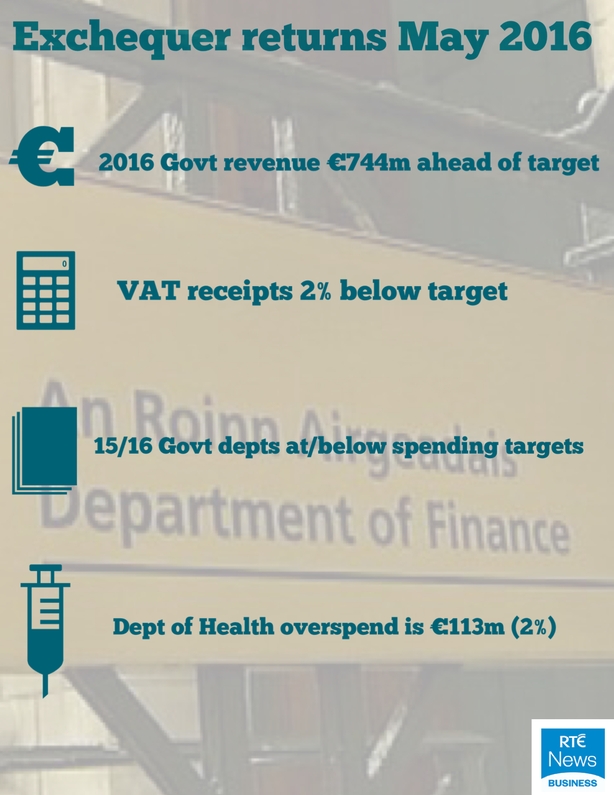Exchequer returns for May show the Government has collected almost €19bn in tax revenue in the first five months of the year, an increase of €1.5bn on the same period last year, and some €744m ahead of target.
However, some €480m of the over-performance came from Corporation Tax payments, which are 40% ahead of target so far this year.
Around half of this sum is believed to be an overpayment and is likely to repaid to the companies concerned in the coming months.
Income tax receipts are on target, while VAT was somewhat stronger than expected in May (a VAT-due month) leaving the total for the year to date some 2% below target, representing an improvement from earlier in the year.
On the spending side, 15 of the 16 departments were at or below their spending targets for the year to date - the exception was, as usual, the Department of Health, which has now overspent by 2% or €113m.
Voted Capital spending was €916m, about €37m below target but €104m (12.8%) higher than the same period last year.
Interest payments on Government debt amount to €3.36bn for the year to date - a year-on-year increase of 1.3% or €42m.

The Exchequer deficit for the period was €125m, compared with a surplus of €641m at the same point last year.
Then the Exchequer benefitted from the sale of PTSB shares and capital notes, which brought in a one-off payment of €2.1bn.
Excluding this transaction, the deficit shows an underlying improvement of €1.37bn, driven by the extra €1.5bn in tax revenue.
Commenting on the figures, Alan McQuaid from Merrion Economics said: "The Minister for Finance Michael Noonan set a General Government Deficit target of 1.2% of GDP for this year although this has subsequently been revised down to 1.1% in the Stability Programme Update.
"With the Irish economy set to grow strongly again in 2016, the underlying deficit is in our view likely to come in at less than 1.0% even allowing for some potential expenditure over-runs, particularly on the Health Vote.
"Ireland’s strategy in recent years has been to under-promise and over-deliver on the budgetary front, one which has been very successful in helping bring Irish government bond yields down to record-low levels.
"As long as the minority government sticks to this strategy then market funding costs should remain low," he added.
Meanwhile, Tax Partner at Grant Thornton Peter Vale said: "The main focus today was on the VAT figure as VAT receipts for the year to date were lagging behind target.
"The VAT receipts for May show a return to positive figures, with the numbers both ahead of target and last year.
"Interestingly, VAT receipts have lagged behind the growth in other tax heads since 2012. Given the strong labour market, it is perhaps surprising that we haven't seen a corresponding surge in VAT receipts," he added.

